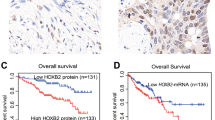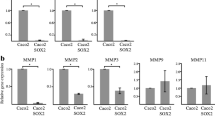Abstract
The aim of this study is to assess the expression levels of SMYD2 in human tissue samples and cells of colon cancer, and further explore the potential mechanisms of SMYD2 in colon cancer progression. Quantitative PCR and Immunohistochemical (IHC) assays were performed to detect SMYD2 expression in 76 tissue samples of colon cancer tissues and the corresponding normal tissues. The potential correlations between SMYD2 expression levels and clinical pathological features were assessed. We further detected the effects of SMYD2 on the proliferation, invasion and apoptosis of colon cancer cells and on ERBB2/FUT4 signaling pathway through Brdu assay, transwell assay and flow cytometry assay, respectively. The potential effects of SMYD2 on tumor growth were explored using an animal model. We demonstrated the possible involvement of SMYD2 in the progression of colon cancer. We found the high expression of SMYD2 in human colon cancer tissues and cells, and found the correlations between SMYD2 expression and the clinicopathological features including vascular invasion (P = 0.007*), TNM stage (P = 0.016*) and lymph node metastasis (P = 0.011*), of patients with colon cancer. Our data further confirmed that SMYD2 affects cell proliferation, invasion, and apoptosis of colon cancer cells via the regulation of ERBB2/FUT4 signaling pathway. We also demonstrated SMYD2 contributed to tumor growth of colon cancer cells in vivo. We investigated the potential involvement of SMYD2 in the progression of colon, and therefore confirmed SMYD2 as a possible therapeutic target for colon cancer.






Similar content being viewed by others
Data availability
All data generated or analyzed during this study are included in this published article.
References
Dewanji A, Jeon J, Meza R, Luebeck EG (2011) Number and size distribution of colorectal adenomas under the multistage clonal expansion model of cancer. PLoS Comput Biol 7(10):e1002213. https://doi.org/10.1371/journal.pcbi.1002213
Peng F, Huang Y, Li MY, Li GQ, Huang HC, Guan R, Chen ZC, Liang SP, Chen YH (2016) Dissecting characteristics and dynamics of differentially expressed proteins during multistage carcinogenesis of human colorectal cancer. World J Gastroenterol 22(18):4515–4528. https://doi.org/10.3748/wjg.v22.i18.4515
Luebeck EG, Moolgavkar SH (2002) Multistage carcinogenesis and the incidence of colorectal cancer. Proc Natl Acad Sci USA 99(23):15095–15100. https://doi.org/10.1073/pnas.222118199
Abd-Elsatar AG, Farag MM, Youssef HF, Salih SA, Mounier MM, El-Meliegy E (2019) Different zeolite systems for colon cancer therapy: monitoring of ion release, cytotoxicity and drug release behavior. Prog Biomater 8(2):101–113. https://doi.org/10.1007/s40204-019-0115-8
Jahanafrooz Z, Mosafer J, Akbari M, Hashemzaei M, Mokhtarzadeh A, Baradaran B (2019) Colon cancer therapy by focusing on colon cancer stem cells and their tumor microenvironment. J Cell Physiol. https://doi.org/10.1002/jcp.29337
Zhao T, Feng Y, Guo M, Zhang C, Wu Q, Chen J, Guo S, Liu S, Zhou Q, Wang Z, Fan W, Zhang Y, Jia H, Feng Z (2019) Combination of attenuated Salmonella carrying PD-1 siRNA with nifuroxazide for colon cancer therapy. J Cell Biochem. https://doi.org/10.1002/jcb.29432
Sajjad A, Novoyatleva T, Vergarajauregui S, Troidl C, Schermuly RT, Tucker HO (1843) Engel FB (2014) Lysine methyltransferase Smyd2 suppresses p53-dependent cardiomyocyte apoptosis. Biochem Biophys Acta 11:2556–2562. https://doi.org/10.1016/j.bbamcr.2014.06.019
Sese B, Barrero MJ, Fabregat MC, Sander V, Izpisua Belmonte JC (2013) SMYD2 is induced during cell differentiation and participates in early development. Int J Dev Biol 57(5):357–364. https://doi.org/10.1387/ijdb.130051ji
Piao L, Kang D, Suzuki T, Masuda A, Dohmae N, Nakamura Y, Hamamoto R (2014) The histone methyltransferase SMYD2 methylates PARP1 and promotes poly(ADP-ribosyl)ation activity in cancer cells. Neoplasia 16(3):257–264. https://doi.org/10.1016/j.neo.2014.03.002
Komatsu S, Ichikawa D, Hirajima S, Nagata H, Nishimura Y, Kawaguchi T, Miyamae M, Okajima W, Ohashi T, Konishi H, Shiozaki A, Fujiwara H, Okamoto K, Tsuda H, Imoto I, Inazawa J, Otsuji E (2015) Overexpression of SMYD2 contributes to malignant outcome in gastric cancer. Br J Cancer 112(2):357–364. https://doi.org/10.1038/bjc.2014.543
Hamamoto R, Toyokawa G, Nakakido M, Ueda K, Nakamura Y (2014) SMYD2-dependent HSP90 methylation promotes cancer cell proliferation by regulating the chaperone complex formation. Cancer Lett 351(1):126–133. https://doi.org/10.1016/j.canlet.2014.05.014
Reynoird N, Mazur PK, Stellfeld T, Flores NM, Lofgren SM, Carlson SM, Brambilla E, Hainaut P, Kaznowska EB, Arrowsmith CH, Khatri P, Stresemann C, Gozani O, Sage J (2016) Coordination of stress signals by the lysine methyltransferase SMYD2 promotes pancreatic cancer. Genes Dev 30(7):772–785. https://doi.org/10.1101/gad.275529.115
Bai HJ, Zhang P, Ma L, Liang H, Wei G, Yang HT (2019) SMYD2 Drives mesendodermal differentiation of human embryonic stem cells through mediating the transcriptional activation of key mesendodermal genes. Stem Cells 37(11):1401–1415. https://doi.org/10.1002/stem.3068
Wang R, Deng X, Yoshioka Y, Vougiouklakis T, Park JH, Suzuki T, Dohmae N, Ueda K, Hamamoto R, Nakamura Y (2017) Effects of SMYD2-mediated EML4-ALK methylation on the signaling pathway and growth in non-small-cell lung cancer cells. Cancer Sci 108(6):1203–1209. https://doi.org/10.1111/cas.13245
Munkanatta Godage DNP, VanHecke GC, Samarasinghe KTG, Feng HZ, Hiske M, Holcomb J, Yang Z, Jin JP, Chung CS, Ahn YH (2018) SMYD2 glutathionylation contributes to degradation of sarcomeric proteins. Nat Commun 9(1):4341. https://doi.org/10.1038/s41467-018-06786-x
Sun JJ, Li HL, Ma H, Shi Y, Yin LR, Guo SJ (2019) SMYD2 promotes cervical cancer growth by stimulating cell proliferation. Cell Biosci 9:75. https://doi.org/10.1186/s13578-019-0340-9
Galvan-Femenia I, Guindo M, Duran X, Calabuig-Farinas S, Mercader JM, Ramirez JL, Rosell R, Torrents D, Carreras A, Kohno T, Jantus-Lewintre E, Camps C, Perucho M, Sumoy L, Yokota J, de Cid R (2018) Genomic profiling in advanced stage non-small-cell lung cancer patients with platinum-based chemotherapy identifies germline variants with prognostic value in SMYD2. Cancer Treat Res Commun 15:21–31. https://doi.org/10.1016/j.ctarc.2018.02.003
Zuo SR, Zuo XC, He Y, Fang WJ, Wang CJ, Zou H, Chen P, Huang LF, Huang LH, Xiang H, Liu SK (2018) Positive expression of SMYD2 is associated with poor prognosis in patients with primary hepatocellular carcinoma. J Cancer 9(2):321–330. https://doi.org/10.7150/jca.22218
Sakamoto LH, Andrade RV, Felipe MS, Motoyama AB, Pittella Silva F (2014) SMYD2 is highly expressed in pediatric acute lymphoblastic leukemia and constitutes a bad prognostic factor. Leuk Res 38(4):496–502. https://doi.org/10.1016/j.leukres.2014.01.013
Zipin-Roitman A, Aqaqe N, Yassin M, Biechonski S, Amar M, van Delft MF, Gan OI, McDermott SP, Buzina A, Ketela T, Shlush L, Xie S, Voisin V, Moffat J, Minden MD, Dick JE, Milyavsky M (2017) SMYD2 lysine methyltransferase regulates leukemia cell growth and regeneration after genotoxic stress. Oncotarget 8(10):16712–16727. https://doi.org/10.18632/oncotarget.15147
Hamaguchi J, Nakagawa H, Takahashi M, Kudo T, Kamiyama N, Sun B, Oshima T, Sato Y, Deguchi K, Todo S, Nishimura S (2007) Swainsonine reduces 5-fluorouracil tolerance in the multistage resistance of colorectal cancer cell lines. Mol Cancer 6:58. https://doi.org/10.1186/1476-4598-6-58
Troiani T, Napolitano S, Della Corte CM, Martini G, Martinelli E, Morgillo F, Ciardiello F (2016) Therapeutic value of EGFR inhibition in CRC and NSCLC: 15 years of clinical evidence. ESMO open 1(5):e000088. https://doi.org/10.1136/esmoopen-2016-000088
Sobral RA, Honda ST, Katayama ML, Brentani H, Brentani MM, Patrao DF, Folgueira MA (2008) Tumor slices as a model to evaluate doxorubicin in vitro treatment and expression of trios of genes PRSS11, MTSS1, CLPTM1 and PRSS11, MTSS1, SMYD2 in canine mammary gland cancer. Acta Vet Scand 50:27. https://doi.org/10.1186/1751-0147-50-27
Li LX, Zhou JX, Calvet JP, Godwin AK, Jensen RA, Li X (2018) Lysine methyltransferase SMYD2 promotes triple negative breast cancer progression. Cell Death Dis 9(3):326. https://doi.org/10.1038/s41419-018-0347-x
Thomenius MJ, Totman J, Harvey D, Mitchell LH, Riera TV, Cosmopoulos K, Grassian AR, Klaus C, Foley M, Admirand EA, Jahic H, Majer C, Wigle T, Jacques SL, Gureasko J, Brach D, Lingaraj T, West K, Smith S, Rioux N, Waters NJ, Tang C, Raimondi A, Munchhof M, Mills JE, Ribich S, Porter Scott M, Kuntz KW, Janzen WP, Moyer M, Smith JJ, Chesworth R, Copeland RA, Boriack-Sjodin PA (2018) Small molecule inhibitors and CRISPR/Cas9 mutagenesis demonstrate that SMYD2 and SMYD3 activity are dispensable for autonomous cancer cell proliferation. PLoS ONE 13(6):e0197372. https://doi.org/10.1371/journal.pone.0197372
Ren H, Wang Z, Chen Y, Liu Y, Zhang S, Zhang T, Li Y (2019) SMYD2-OE promotes oxaliplatin resistance in colon cancer through MDR1/P-glycoprotein via MEK/ERK/AP1 pathway. OncoTargets Ther 12:2585–2594. https://doi.org/10.2147/OTT.S186806
Funding
Not applicable.
Author information
Authors and Affiliations
Contributions
YY conceived and designed the experiments, YZL analyzed and interpreted the results of the experiments, and YZL and YY performed the experiments.
Corresponding author
Ethics declarations
Conflict of interest
The authors state that there are no conflicts of interest to disclose.
Ethical approval
Tumor tissues were obtained from Chongqing University Cancer Hospital. All procedures performed in studies involving human participants were in accordance with the standards upheld by the Ethics Committee of Chongqing University Cancer Hospital and with those of the 1964 Helsinki Declaration and its later amendments for ethical research involving human subjects. All animal assay processes were approved by the Ethics Committee of Chongqing University for the use of animals and conducted in accordance with the National Institutes of Health Laboratory Animal Care and Use Guidelines.
Additional information
Publisher's Note
Springer Nature remains neutral with regard to jurisdictional claims in published maps and institutional affiliations.
Rights and permissions
About this article
Cite this article
Lai, Y., Yang, Y. SMYD2 facilitates cancer cell malignancy and xenograft tumor development through ERBB2-mediated FUT4 expression in colon cancer. Mol Cell Biochem 477, 2149–2159 (2022). https://doi.org/10.1007/s11010-020-03738-2
Received:
Accepted:
Published:
Issue Date:
DOI: https://doi.org/10.1007/s11010-020-03738-2




